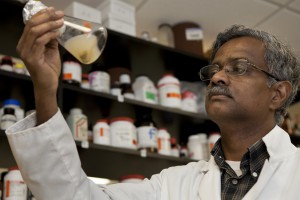Researchers at the University of Florida Institute of Food and Agricultural Sciences (UF/IFAS) may have broken the code on better algae-based biofuels. Bala Rathinasabapathi, a UF/IFAS professor of horticultural sciences, said they have identified a “transcription factor” called ROC40 that controls the expression of many genes inside algae. He likens this process to a policeman controlling a large crowd.

UF/IAFS Horticulture Professor Balasubramanian Rathinasabapathi, seen here working in his Gainesville lab, has found what could be a big key to converting microalgae to biofuel. He and former doctoral student Elton Gonçalves found that the transcription factor ROC40 helps control lipid production when the algal cells were starved of nitrogen. Credit: Tyler Jones, UF/IFAS photography.
While starving algae of nitrogen to draw out the lipids, it was discovered that the synthesis of ROC40 was the most induced when the cells made the most oil. According to Elton Gonçalves, a former UF/IFAS doctoral student in the plant molecular and cellular biology program, this suggested to the researchers that ROC40 could be playing an important biological role. The team’s research found that ROC40 helps control lipid production when the algal cells were nitrogen starved. This suggests the ROC40 protein may be increasing the expression of genes involved in the synthesis of oil in microalgae.
“Such information is of great importance for the development of superior strains of algae for biofuel production,” said Gonçalves. “We conducted this research due to the great socioeconomic importance of developing renewable sources of fuels as alternatives for petroleum-based fuels for future generations. In order to advance the production of algal biofuels into a large-scale, competitive scenario, it is fundamental that the biological processes in these organisms are well understood.”
Rathinasabapathi added that this information is valuable for the future for engineering algae so it overproduces oil without starving the algae of nitrogen.
Rathinasabapathi and Gonçalves co-authored the study, which has been accepted for publication in The Plant Journal.

